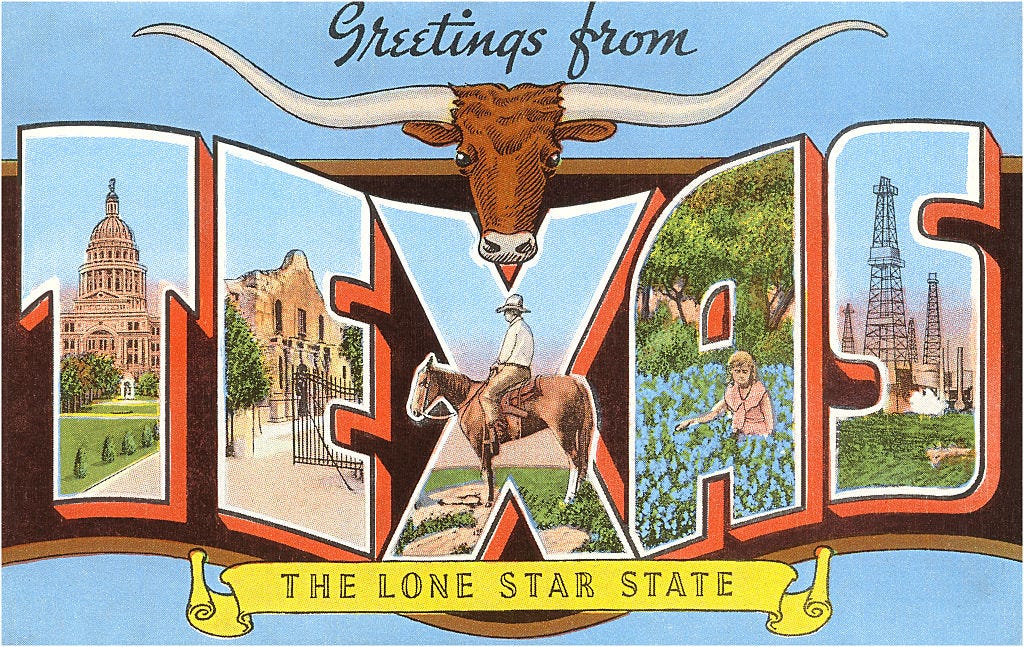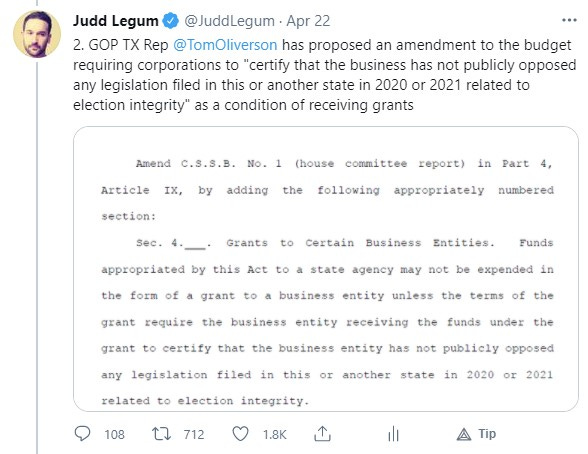UPDATE: Some corporations break their silence on Texas' voter suppression bills
For months, members of the Texas legislature have been considering two bills (SB7 and HB6) that would make it harder to vote — particularly in areas with large Black populations like Harris County. In March, Popular Information reported that the sponsors of these bills are backed with millions from corporate PACs. But, with a couple of prominent exceptions, corporations remained silent.
Now, with the Texas legislative session drawing to a close and the fate of the bills still in limbo, that is finally starting to change.
On Tuesday, a group of national and state corporations signed a statement organized by a group called Fair Vote Texas. "We stand together, as a nonpartisan coalition, calling on all elected leaders in Texas to support reforms that make democracy more accessible and oppose any changes that would restrict eligible voters’ access to the ballot," the statement says. It was signed by American Airlines, Unilever, HP, Patagonia, Levis, Salesforce, Microsoft, and other prominent companies. Although the Fair Vote Texas statement does not mention SB7 and HB6 by name, the Wall Street Journal reports that "people involved in drafting the statement said it was intended to oppose them."
The statement was released as Republicans are pressuring corporations in every way possible to keep quiet about voter suppression. The leadership of the Greater Houston Partnership, a prominent business group based in Harris County, decided to stay neutral. But this decision was not acceptable to many of its members, who broke away and issued their own letter to Texas House Speaker Dade Phelan (R) opposing the bills. The letter from this splinter group lays out the problems with SB7 and HB6 in impressive detail.
What's unclear is if any of this activity is enough to derail Republican efforts to restrict voting in Texas. Especially since the top corporate donors to the sponsors of SB7 and HB6 are conspicuously absent from both letters.
The Heidi Cruz factor
On May 3, a group of 175 business and community leaders sent a letter to Republican Texas House Speaker Dade Phelan to express their opposition to HB6 and SB7. All the signatories are members of the Greater Houston Partnership (GHP), an influential business group, and ten are members of the GHP board.
But the letter did not come from the GHP itself, which represents major corporations like Chevron, Goldman Sachs, BP, ExxonMobil, and McKinsey. The GHP tabled a call to action regarding the bills after its president Bob Harvey stated that “it is clear there is not a consensus.”
But according to one GHP board member, Gerald Smith, this decision was premature. Several GHP board members had been urging the group to revise its stance on voting rights since at least the beginning of April. On April 21, Harvey pledged to host a special session to discuss this issue. Yet, Harvey never held the meeting, forcing Smith and other members to issue their own statement.
“When you have an organization that is supposed to reflect the diversity and inclusion, and has taken steps on its website to discuss racial equality but does not have the spine to bring forth to a vote an issue that is as important as this, we felt we had no choice but to bring it in a public forum,” Smith told the Houston Chronicle.
Clearly, there was powerful opposition within the group against opposing this legislation. One member of the board is Heidi Cruz, the wife of Senator Ted Cruz (R-TX) and a managing director at Goldman Sachs. Ted Cruz recently wrote an op-ed in the Wall Street Journal decrying "woke CEOs" who were speaking out against voting restrictions. It is not known what role Heidi Cruz had, if any, in keeping the GHP quiet.
They read the bill
In a rambling press conference in April, Texas Lieutenant Governor Dan Patrick (R) repeatedly accused corporations that opposed HB6 and SB7 of not reading the bill. But the business leaders who wrote the May 3 letter demonstrated they had, explaining in one succinct paragraph how the legislation suppressed votes.
Our concerns include, in part, provisions that would reallocate polling machines away from Houston’s urban core; limit extended voting hours and drive-through voting options that were used more heavily by Black and brown voters in 2020; remove constraints on partisan poll watchers with a history of voter intimidation practices; threaten naturalized citizens with erroneous removal from the voter rolls or increased burdens to become registered; make it harder for anyone with a disability to get the assistance they need to vote; and increasing the onerous and unnecessary threat of criminal penalties and jail time for poll workers, election officials, voter assistants, and voters.
Much of this is self-explanatory. But the reference to the reallocation of voting machines away from urban Houston is a reference to a provision in SB7 that would require all countywide polling places to have approximately the same number of machines. This would prevent election officials from placing more machines in densely populated areas. It would also effectively prohibit the use of arenas, like Houston's Toyota Center, that were used effectively in 2020 to boost turnout.
Top corporate donors stay quiet
The fact that hundreds of companies and executives are, with various levels of specificity, opposing SB7 and HB6 is significant. But Popular Information analyzed Texas campaign finance records over the last three years to identify 26 of the top corporate donors to the sponsors of these bills. This included five companies that have donated more than $300,000 to the bill sponsors since 2018 — Oncor (577K), AT&T (574K), USAA (370K), Charter Communications (346K), and Farmers Insurance (332K).
None of those 26 companies signed either the letter from the splinter group or the Fair Vote Texas statement opposing efforts to restrict voting in Texas.
Several companies, including AT&T, Deloitte, United Airlines, and Comcast, have board seats on the GHP — the group that has maintained a "neutral" position on the legislation.
Republicans make threats
Republican legislators have made threats publicly and privately against any corporation that speaks out against legislation to restrict voting. In late-April, Republicans introduced several amendments to the budget which would withhold funds from corporations that publicly oppose voter suppression. Texas Representative Tom Oliverson (R) introduced legislation that would withhold certain government funds from any corporation that "publicly opposed any legislation filed in this or another state in 2020 or 2021 related to election integrity."
This and several similar amendments did not end up making it into the budget. But the message was clear.
Privately, Texas legislators were threatening retribution against companies that spoke out, according to a spokesperson for Patagonia, which signed the Fair Vote Texas statement.
Corley Kenna, a spokeswoman for Patagonia, said she had heard countless stories about lawmakers in Texas who let companies know that if they spoke up on voting rights, favors that once came regularly could dissipate.
Someone "involved the statewide efforts to organize businesses," told a similar story to NBC News. "I literally heard one business be like, we’re gonna step out, but then we’re going to have to prepare ourselves for the punishment that Dan Patrick and the legislature will put on us," the source said.
Some companies were swayed by these hardball tactics and others were not.
The road ahead
Thus far, SB7 has passed the Texas Senate but no legislation has passed the Texas House. Last week, in an unusual move, Representative Briscoe Cain (R) , who chairs the House Election Committee, abruptly announced that he was amending SB7 so that it was identical to HB6. After some drama, this bill was passed out of the Election Committee on a 5 to 4 vote.
The full House is expected to vote on HB6 on Thursday. Should it pass the House, the House and Senate would need to harmonize their legislation, vote again on the combined bill, and Governor Greg Abbott (R) would need to sign it into law.
Will the statements by corporations on Tuesday be enough to derail this process? Stay tuned.





I have very gradually come to understand, with sadness, disappointment and shame that American politics is quite literally based on racism and white male privilege. It is at the root of many of our laws and business dealings. Continuing to believe that this is not what America was intended to be is my own naivety. It’s exactly what this country was originally founded upon. However, I do not believe that it should continue like this and that my country is more than past due for MAJOR changes. Changes that would make the dream of ‘ALL MEN (and women) are created equal’; and will actually be treated as such, a reality. The American Dream was never meant to be inclusive...but we need to change that. We need to work hard to make it so.
Appreciate you continuing to cover these thugs in the Texas GOP who would try to strong-arm corporations (not that I have any great love for corporations, mind you) for the sake of anti-democratic policies, Judd.